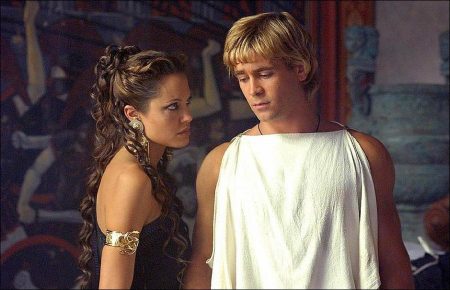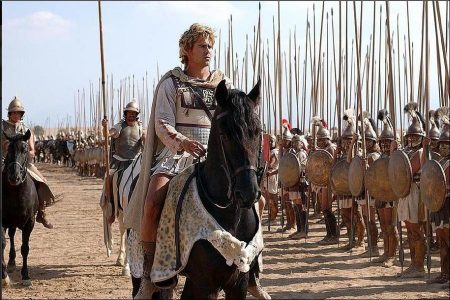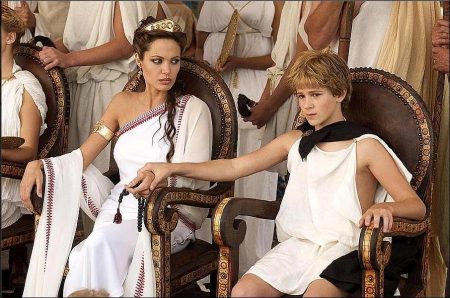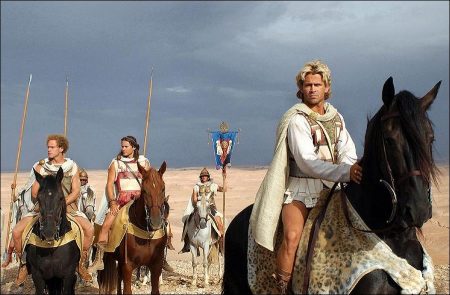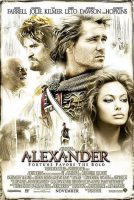Tagline: Fortune favors the bold.
Alexander, Oliver Stone’s sweeping historical saga that charts the life and legend of one of the greatest figures in world history. The story is an epic that is as daring and ambitious as its subject, a relentless conqueror who by the age of 32 had amassed the greatest empire the world had ever seen.
He was many things to many people — a dashing warrior king, filled with ambition, courage and the arrogance of youth, leading his vastly outnumbered forces against the massive Persian armies…a son desperately longing for the approval of his stern, battle-scarred father, torn and conflicted by his mother’s legacy… a relentless conqueror who never lost a battle and drove his soldiers to the very edges of the known world…a visionary whose dreams, deeds and destiny echo through eternity, helping to shape the world as we know it today. He was all that and more. He was Alexander the Great.
Oliver Stone’s Alexander is based on the true story of one of history’s most luminous and influential leaders (Colin Farrell) — a man who had conquered 90% of the known world by the age of 25. Alexander led his virtually invincible Greek, Macedonian, and later Eastern armies through 22,000 miles of sieges and conquests in just eight years, and by the time of his death at the age of 32, had forged an empire unlike any the world had ever seen.
Set in Alexander’s pre-Christian world of social customs and morals far different from today’s, the film explores a time of unmatched beauty and unbelievable brutality, of soaring ideals and staggering betrayals. The film takes a bold, honest look at Alexander’s life and his relationships with his mother, Olympias (Angelina Jolie), his father Philip (Val Kilmer), his lifelong friend and battle commander Hephaistion (Jared Leto), Roxane, his ambitious and beautiful wife (Rosario Dawson), and his trusted general and confidant Ptolemy (Anthony Hopkins).
His extraordinary journey begins when Alexander launches his invasion from Macedonia, first leading his armies to wrest Western Asia from Persian control, then driving his enormously outnumbered troops to an impossible victory over the mighty Persian army itself.
Alexander expands his empire into the unknown lands of modern day Central Asia before venturing across the Hindu Kush, further than any Westerner had ever gone, continuing his conquests into the exotic world of India. Incredibly, and possibly unique in the annals of military history, Alexander was never defeated in battle. He relentlessly pushes his army across the sands, mountains and jungles of strange and mysterious lands, conquering every enemy who dares oppose him and weathering near-mutiny by his own men.
The film chronicles Alexander’s path to becoming a living legend, from a youth fueled by dreams of myth, glory, and adventure, to his intense bonds with his closest companions, to his lonely and mysterious death as ruler of a vast Empire. Alexander is the incredible story of a life that united the known world and proved, if nothing else, fortune favors the bold.
Introduction
Alexander the Great conquered the world not only by virtue of his military genius, but perhaps even more importantly, with the power of his ideas. What Alexander accomplished in his near 33 years on earth have reverberated through the centuries, still informing how life is lived throughout the lands he conquered more than two thousand years ago. Although he was the ultimate warrior, Alexander had the soul of an explorer – in his 22,000-mile march, he sought not to destroy, but to re-invent each society in the mold of his own vision for a new world, and perhaps a new destiny for the human race. Through his actions, Alexander temporarily united East and West, spreading Hellenistic thought and culture throughout the Eastern world with lasting effect.
His accomplishments were astonishing by any standards. His empire included lands that now comprise the countries of Greece, Albania, Turkey, Bulgaria, Egypt, Libya, Israel, Jordan, Syria, Lebanon, Cyprus, Iraq, Iran, Afghanistan, Uzbekistan, Pakistan and India. In 323 B.C., the year of his death, it comprised well over two million square miles.
Alexander has been the subject of an enormous body of written works, historical, fictive, psychological and even practical (as evidenced by two recently published books that translate Alexander’s military strategy into a guide for modern businessmen), but except for one attempt by Hollywood nearly 40 years ago, no filmmaker has found a way to translate Alexander’s extraordinary life to the screen – until Oscar-winning director/screenwriter Oliver Stone took on the challenge of telling the story in the epic Alexander.
The film’s production incorporated a multitude of disciplines, all designed to bring the exact quality and look of Alexander’s world to life. The numerous sets included detailed re-creations of lavish palaces, the extraordinary Alexandria Library and the magnificent city of Babylon, including its legendary Hanging Gardens, one of the Seven Wonders of the Ancient World. Additionally, each actor’s accent was specifically chosen to reflect the interconnected languages and wide array of dialects of the time.
In preparation for their roles, all the actors portraying soldiers, including stars Colin Farrell and Jared Leto, underwent extensive training in ancient battle strategies and the use of exact replicas of Macedonian and Greek weaponry. The battles are epic in scope – recreated for the screen are the Battle of Gaugamela, where Alexander’s heavily outnumbered troops resoundingly defeated the vast Persian army, and a vicious battle in the forests of India in which his troops fight against enormous elephants.
“The beauty of Alexander is that he won,” says Stone, whose acclaimed films include Any Given Sunday, Nixon, Natural Born Killers, JFK, The Doors, Born on the Fourth of July, Wall Street and Platoon. “He’ll always be known for at least two reasons – that he conquered the world without ever suffering a military defeat, and as a visionary and a man of remarkable and generous spirit. He was perhaps the greatest warrior of all time, greater than his mythic heroes Achilles and Herakles. He grew up under the influence of these mythological Greek figures and he believed in them as no other child. Out of that belief and faith grew this monumental drive and destiny, which he actually achieved.”
Fascinated by Alexander since childhood and inspired by Greek mythology, Stone dreamed of making Alexander’s story for years. “I had frustrated student fantasies of going back in time with documentary cameras and a small crew to actually film Alexander’s military campaigns,” he recalls. “32 years later, I finally had one chance to go back in time and actually recreate the period as best I could.”
Alexander producer Moritz Borman was intrigued by the extent to which Stone had delved into Alexander’s mind in his screenplay. “Most of us have some historical knowledge of Alexander,” Borman notes, “but don’t know much about the man himself, his soul, his inner workings. Oliver’s script asked where he came from, what were his trials and tribulations, how did his cultural environment form him, what happened when he encountered different cultures and confronted apparently impossible situations. This was not just a history lesson, but a script about a man who all of us could very well relate to today, with many of the themes of our time. The whole story of Alexander just came alive in the script, a truly dramatic and glorious tale.”
Serving as historical advisor to Stone was Robin Lane Fox, a fellow of New College, Oxford, whose 1972 biography of Alexander has sold more than a million copies and is considered one of the finest contemporary works on his life. Lane Fox’s encyclopedic knowledge of Alexander’s life provided the filmmaker with information for his screenplay and occasional on-set expertise.
“I first met Oliver three years ago in London,” Lane Fox recalls, “and he bombarded me with questions, a process that went on for months. He wanted to understand everything from how Greeks would behave at a dinner party to what Aristotle meant to Alexander. “I think Oliver’s strength as a historical dramatist is that his mind has a real feel for the character. He has an epic eye and dimension. Oliver has aimed high to present the greatness, and it will surprise historians to the degree to which he’s tried to convey the balance of Alexander’s accomplishments, both good and bad.”
Stone’s film is by definition interpretive, as are all works of historical fiction. Alexander lived in ancient times, and even his earliest historians could only take their best guess at the truth. “Cramming every incident of Alexander’s extraordinary life into one feature film would be quite literally impossible,” notes Lane Fox, “and there are also mysteries that may never be solved. I understand why Oliver made the decisions to omit certain incidents in Alexander’s life, or to make slight changes in the sequence of events. One of the fascinations about Alexander is the gaps in what we can know – they give such scope for the imagination.”
Stone doesn’t see the story of Alexander as belonging solely to the ancient world. “The incredible thing about Alexander was that he knew all of the Greek myths, and then acted them out in his real life. He had a lot of demon drives that modern people have, and one of my hopes is that the movie will bring back some sense of history that there were other times and places, empires that ruled the earth and men who were great dreamers and visionaries. Everyone, especially young people now, should be given a sense of history and the possibility of idealism; that should never be corrupted.”
Alexander (2004)
Directed by: Oliver Stone
Starring: Colin Farrell, Rosario Dawson, Val Kilmer, Anthony Hopkins, Angelina Jolie, Christopher Plummer, David Bedella, Fiona O’Shaughnessy, John Kavanagh
Screenplay by: Oliver Stone
Production Design by: Jan Roelfs
Cinematography by: Rodrigo Prieto
Film Editing by: Yann Hervé, Gladys Joujou, Alex Marquez, Thomas J. Nordberg
Costume Design by: Jenny Beavan
Set Decoration by: Jim Erickson
Art Direction by: Lek Chaiyan Chunsuttiwat, Stéphane Cressend, Desmond Crowe, James Lewis, Kathleen Lorden, Jonathan McKinstry, Kevin Phipps, Stuart Rose
Music by: Vangelis
MPAA Rating: R for violence and some sexuality / nudity.
Distributed by: Warner Bros. Pictures
Release Date: November 24, 2004
Box Office Totals
Domestic: $34,297,191 (20.5%)
Foreign: $133,001,001 (79.5%)
Total: $167,298,192 (Worldwide)
Views: 150
